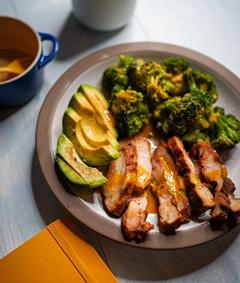Cancer is a disease that affects millions of people globally. But did you know that what we eat can help prevent or slow down its progression?
Today, we look at ten anti-cancer foods that contain powerful compounds scientifically proven to fight against cancer cells.
Cancer is a sneaky and complex disease that causes cells to grow uncontrollably and even spread to other parts of the body.
This happens because of damage to the DNA in your cells that build up over time. These changes are called “gene mutations“.
So, what causes gene mutations? Researchers at the University of Texas found that genetics account for only 5-10% of cancer cases. The majority of cases, about 90-95%, are caused by a combination of diet, lifestyle, and the environment.
Not surprisingly, 25-30% of all cancer deaths are attributed to smoking. But, the most significant factor researchers identified was poor diet, which accounts for 30-35% of cancer cases worldwide, resulting in over two million deaths annually.
There are many types of cancer, but they all start from abnormal cells that divide and grow uncontrollably. When these cells stick together to form a lump, it is called a tumor. If left untreated, the tumor can damage nearby organs and tissues.
Even worse, some cancer cells can break off and travel to other parts of the body through the blood or lymphatic system. Fortunately, if cancer is detected early on, it is possible to reverse it.
Now, let’s get into the 10 anti-cancer foods you need to eat that may prevent, and even stop cancer.
As always, this video is educational and does not constitute medical advice; we are not doctors.
Let’s begin with Number 10. “Mushrooms”.
Mushrooms aren’t just great in your cooking—they have bioactive compounds, like beta-glucans and polysaccharides, that have been studied for their effects on stomach, colorectal, breast, and prostate cancers.
These compounds help stop cancerous blood vessels from growing and cancerous cells from spreading, among other anti-cancer benefits.
A study published in the Journal of Nutrition found that consuming white button mushrooms daily for four weeks led to an increase in natural killer cell activity, which plays a key role in fighting cancer.
Other studies show that Shiitake, Maitake, Turkey Tail, and Reishi mushrooms activate immune cells, prevent cancer growth, and induce cell death, or apoptosis, in cancer cells.
What’s more, mushrooms protect against breast and other hormone-related cancers because they inhibit an enzyme called aromatase, which produces estrogen.
Finally, mushrooms are rich in antioxidants that help protect against oxidative stress and inflammation; two factors that contribute to cancer development.
Coming up next is Number 9. “Garlic”.
The anti-cancer effects of garlic are attributed to its organosulfur compounds, which have been proven to inhibit cancer cell growth and induce cell death.
According to studies, eating garlic can provide protection against certain types of cancer such as breast, colon, lung, prostate, and stomach cancer.
Raw garlic is deemed to be more effective at preventing cancer than cooked garlic, as heat destroys some of the beneficial compounds in it. Black or aged garlic extract has also proven effective at inhibiting the growth of cancer cells.
A study of 41,387 Iowa women found that those with the highest garlic intake had a 50% lower risk of certain colon cancers than those with the lowest garlic intake.
Next on the list is Number 8. “Berries”.
Strawberries, blueberries, raspberries, or any other type of berry are not only delicious but also packed with cancer-fighting compounds.
One of the key anti-cancer compounds is ellagic acid. Research by the American Institute of Cancer Research has shown that ellagic acid inhibits tumor growth and utilizes multiple cancer-fighting methods simultaneously.
Firstly, it acts as an antioxidant, which helps to neutralize free radicals that can cause cell damage leading to cancer. Additionally, ellagic acid assists the body in deactivating certain carcinogens and has been shown to slow the spread of cancer cells.
Berries also contain anthocyanins and resveratrol, two other powerful antioxidants that protect your cells against skin cancer, as well as cancers of the bladder, lungs, breast, and esophagus.
Are you enjoying the information? Make sure you like, share and subscribe and click on notifications so you never miss a video.
Moving on we have Number 7. “Turmeric”.
The vibrant orange spice, turmeric, is a staple in Indian curries and contains a potent anti-cancer polyphenol called curcumin.
Thousands of studies have shown that curcumin supports the body’s natural cancer-fighting mechanisms by reducing inflammation, enhancing immune function, and forcing cancer cells to self-destruct. Talk about a superhero spice!
Turmeric is particularly effective against several types of cancer, including breast, colon, prostate, lung, liver, and pancreatic cancer.
But here’s where things get really exciting: research suggests that turmeric could be just as effective as chemotherapy drugs in treating certain cancers.
Furthermore, curcumin can improve chemotherapy’s effectiveness by destroying multidrug-resistant cancer and cancer stem cells. It can also protect against damage caused by radiation.
Coming up next, Number 6 is “Cruciferous Vegetables”.
Researchers have found that eating cabbage and other vegetables from the crucifer family, such as broccoli, arugula, cauliflower, kale, and turnips, may help protect against certain types of cancer. In particular, these vegetables have been linked to a reduced risk of breast, lung, colorectal, and prostate cancers.
These vegetables contain two important chemicals, glucosinolates and myrosinase, which work together to produce anti-cancer compounds called isothiocyanates (ITCs). ITCs can remove cancer-causing agents, kill cancer cells, and prevent tumors from growing.
Plus, cruciferous vegetables also reduce inflammation, activate anti-cancer enzymes, and “turn on” genes that slow cancer cell growth and promote cancer cell death.
They are also rich in vitamins and minerals like vitamin C, manganese, folate, potassium, fiber, and carotenoids that promote cell communication, regulate abnormal cells, and support the immune system.
The benefits of these cancer-fighting veggies are maximized when you, chop, blend, or chew them.
Next, at Number 5, we have “Dark, Leafy Greens”.
Leafy, dark green vegetables such as kale, collards, spinach, chard, certain kinds of lettuce, bok choy, and mustard greens are truly superheroes in the plant world.
They contain the antioxidants lutein and zeaxanthin, which work together to block early cancer development.
Plus, the carotenoids in these greens, which are responsible for their rich green color, are linked to a reduced risk of breast, skin, stomach, mouth, pharynx, and larynx cancer.
Coming up next is Number 4. “Red Grapes”.
Red grapes are packed with special nutrients that help the body fight diseases, including anthocyanins and proanthocyanidins. The skin of red grapes is rich in an antioxidant called resveratrol. Studies show that resveratrol can stop the development or worsening of skin and breast cancer, and 12 types of leukemia.
Coming into the top 3, Number 3 is “Legumes”.
Did you know that legumes such as beans, peas, lentils, peanuts, and soybeans are cancer-fighting powerhouses? These amazing foods are brimming with fiber, which has been linked in some studies to lower rates of breast, colorectal, and prostate cancer.
One study found that people who ate beans and lentils had a reduced risk of cancer of the entire digestive tract, including cancers of the mouth, stomach, colon, and rectum, as well as cancer of the kidney.
But wait, there’s more! Legumes also contain phytochemicals, folate, lignans, and saponins, all of which can help protect against cancer and promote overall health.
Next, our Number 2 is “Walnuts”.
Walnuts are more than just a tasty snack––they’re also chock-full of cancer-fighting compounds! Ellagic acid and gamma-tocopherol (a type of vitamin E), found in these nuts, both have anti-inflammatory and cancer-fighting properties. Studies have found that walnuts, in particular, are especially protective against breast and prostate cancers.
And at Number 1, we have “Celery”.
Did you know that celery packs a powerful punch against cancer? It may be around 95% water, but this mighty green stalk contains two anti-cancer compounds: apigenin and luteolin.
Apigenin, an anti-tumor compound, has been shown to cause cell suicide in various cancer types and rivals commercial anti-inflammatory drugs in reducing inflammation.
Meanwhile, luteolin can disrupt the replication cycle of cancer cells. One study found that luteolin can block pathways necessary for the growth of colorectal cancer cells.
Celery has also been shown to be effective against ovarian, pancreatic, prostate, breast, liver, and lung cancer cells.
Chinese research even suggests that eating two medium stalks of celery two to three times weekly could help reduce the risk of lung cancer by 60%.
This content was originally published here.




















